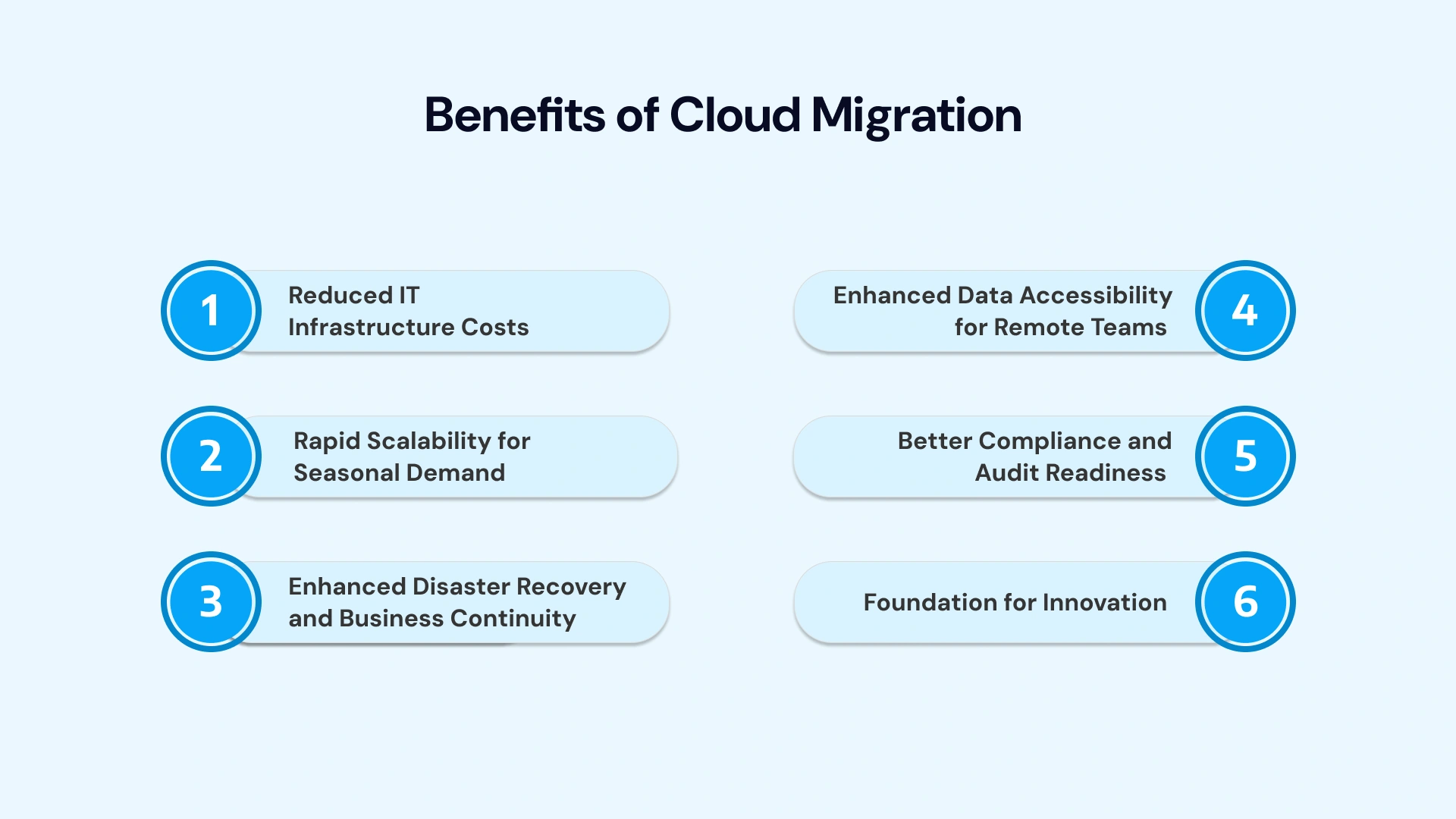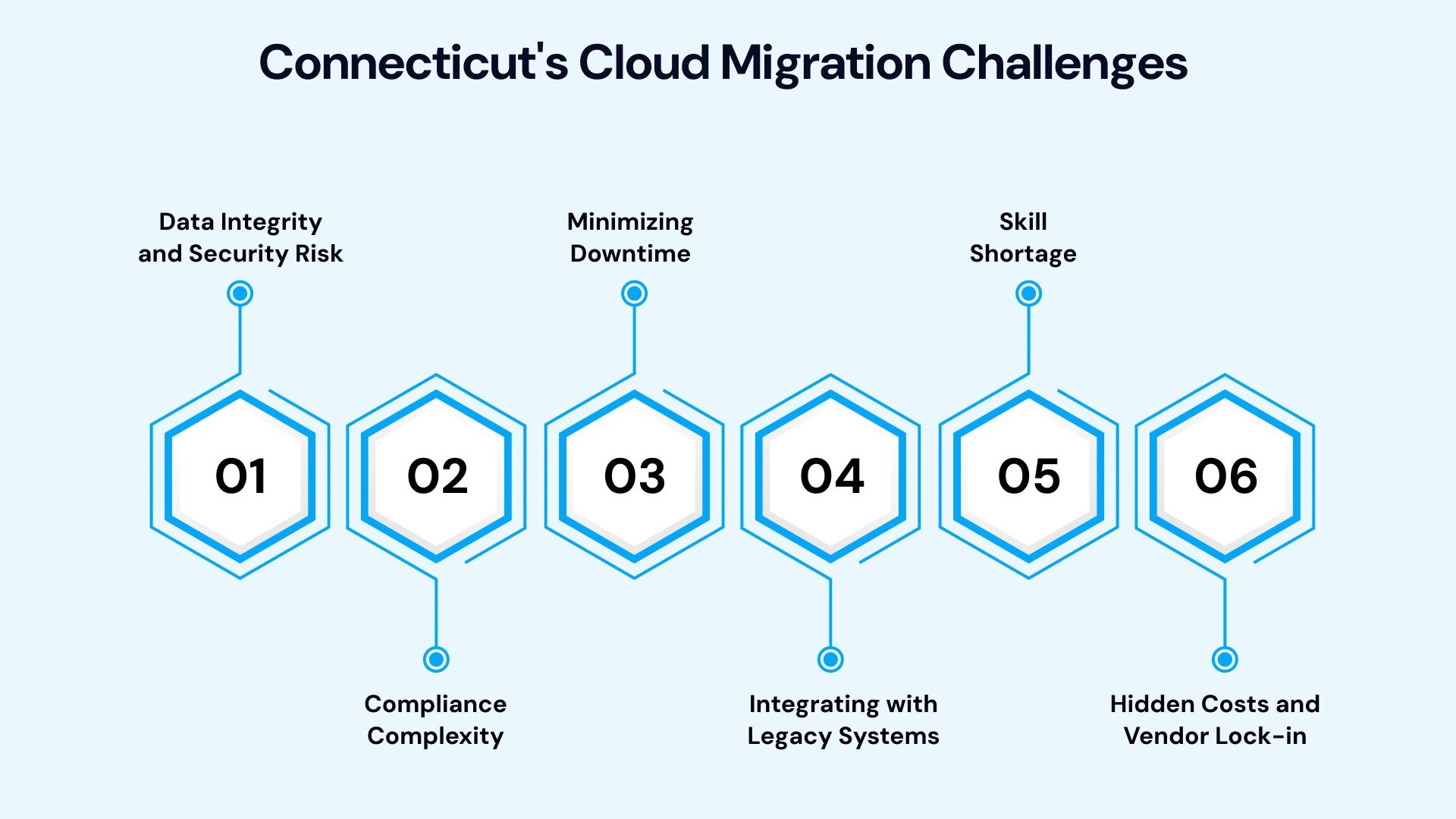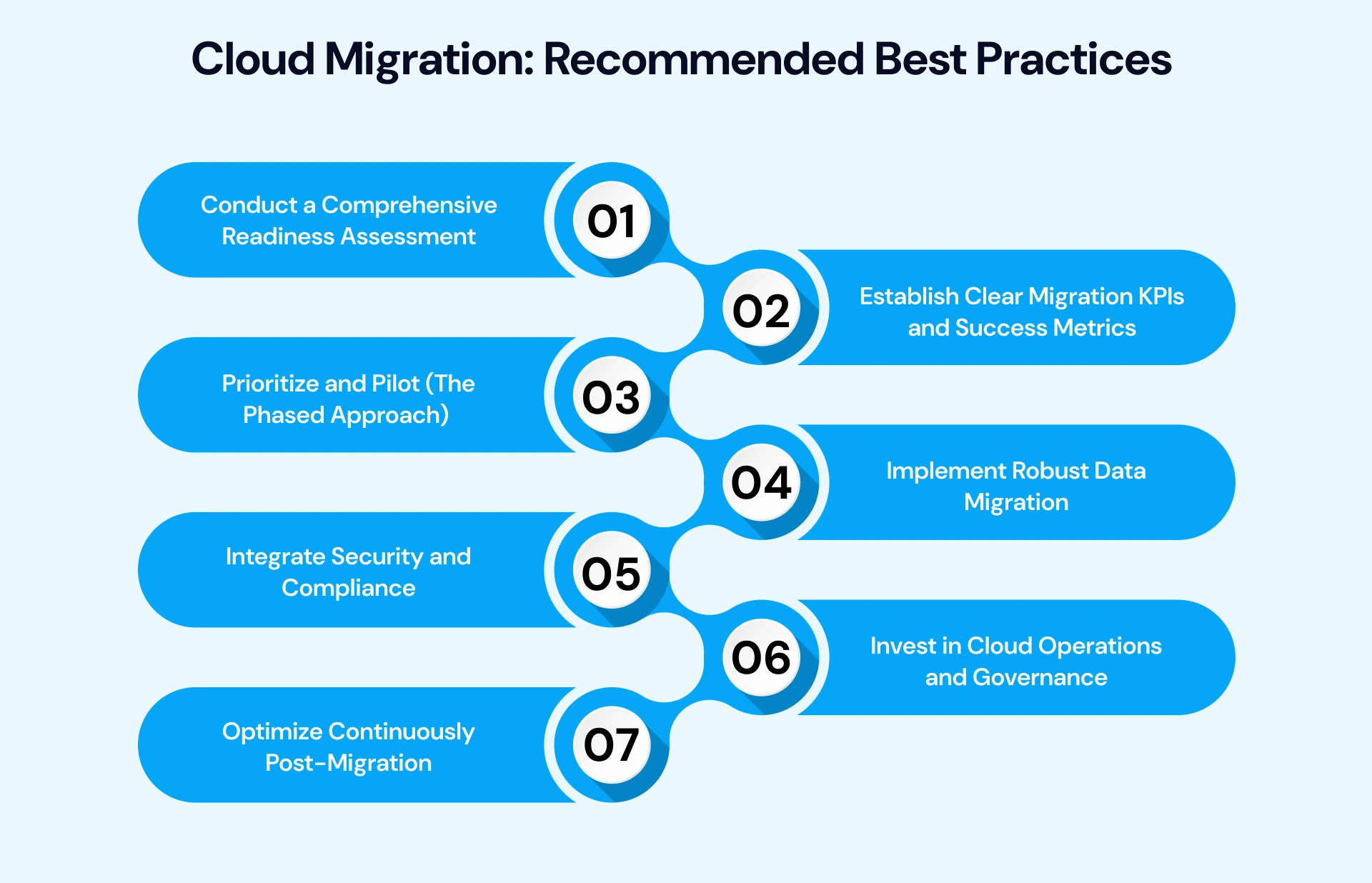As competition grows and operational complexity increases, many organizations across the Constitution State are shifting away from legacy systems and toward scalable, agile infrastructure. The driving force? Cloud migration for Connecticut businesses is no longer just a technological upgrade — it’s a strategic imperative for long-term growth.
For mid-sized businesses in Connecticut, embracing the cloud means staying ahead of peers, modernizing legacy operations, and unlocking new growth pathways. The local economy, particularly in key sectors like finance, insurance, and specialized manufacturing, relies heavily on data security, regulatory compliance, and system resilience. Simply moving to the cloud is not enough; a successful transition requires precise, local knowledge.
For Connecticut organizations seeking to modernize with confidence, partnering with local cloud migration experts is a smarter approach. With deep knowledge of regional business climates, data laws (like the CTDPA), and infrastructure conditions, these experts can guide smoother migrations and accelerate your return on investment.
What is Cloud Migration and Why Does It Matter for Connecticut Businesses?
Cloud migration is the foundational process of moving an organization’s data, applications, and IT workloads from on-premises infrastructure to cloud environments such as Amazon Web Services (AWS), Microsoft Azure, or Google Cloud Platform (GCP). It’s the essential first step toward true digital transformation.
For cloud infrastructure services Connecticut, this shift represents more than just a tech upgrade—it’s a strategic move to stay competitive in a rapidly digital economy. As local industries like finance, healthcare, and manufacturing modernize, cloud migration for businesses supports flexibility, compliance, and innovation that on-premise systems simply cannot match. It’s the engine driving the necessary process of legacy app modernization services.
Key aspects include:
- Moving enterprise data, apps, and workloads to a hyperscale cloud provider.
- Driving agility, scalability, and data security to handle market fluctuations and seasonal demand.
- Supporting compliance with complex regulations like the Connecticut Data Privacy Act (CTDPA), FINRA, and HIPAA checklist, which are non-negotiable for local firms.
Key Benefits of Cloud Migration for Mid-Sized Connecticut Enterprises
For mid-sized enterprises, cloud migration for businesses delivers tangible operational and financial advantages that directly boost the bottom line. By shifting to a secure and scalable environment, Connecticut companies can respond more quickly to market changes, increase profitability, and reduce unpredictable overhead costs. Studies show that SMBs using the cloud experience 26% faster growth and 21% more profit.

Top benefits include:
- Reduced IT Infrastructure Costs: Eliminate significant capital expenditures on hardware, maintenance, and data center space, transitioning to a predictable operational expenditure (OpEx) model.
- Rapid Scalability for Seasonal Demand: Connecticut businesses, particularly those in retail or specialized manufacturing, can dynamically adjust their compute and storage resources as business needs fluctuate, paying only for what they use.
- Enhanced Disaster Recovery and Business Continuity: Protect critical business data with built-in redundancy, automatic backups, and geographically distributed failover capabilities, significantly lowering recovery time objectives (RTO).
- Enhanced Data Accessibility for Remote Teams: Facilitate secure, seamless access to applications and data for a hybrid workforce, a vital component of the modern Connecticut business landscape.
- Better Compliance and Audit Readiness: Simplify data governance and lifecycle management, making it easier to meet local (CTDPA) and federal compliance standards for sensitive data. This is key for security and compliance in cloud migration.
- Foundation for Innovation: The cloud provides access to advanced tools, such as AI, Machine Learning, and IoT, enabling application modernization during migration and opening up new product and service lines.
Cloud Migration Strategies for Connecticut Businesses
Choosing the right strategy; or combination of techniques, is key to minimizing risks and maximizing ROI. The process is never a one-size-fits-all, especially when dealing with complex, regulated systems standard in cloud migration guides for Connecticut businesses.
The "6 Rs" model defines the core strategies:
| Strategy | Description | Best for CT Companies When |
| Rehost (Lift-and-Shift) | Quickly move workloads with minimal modification, moving a VM from on-premise to the cloud. | Speed is the priority for non-differentiating applications. Lowest initial cost. |
| Replatform (Lift-and-Reshape) | Modify existing applications slightly to leverage cloud capabilities (e.g., replacing an on-premises database with a managed cloud database service). | Seeking faster performance and better cost management without a full rewrite. |
| Refactor/Re-architect | Redesign applications to leverage cloud-native features (microservices, serverless architecture). True application modernization during migration. | Competitive advantage is the ultimate goal, unlocking maximum agility, scalability, and cost efficiency. |
| Repurchase (Drop and Shop) | Moving from a custom application to a SaaS (Software as a Service) equivalent (e.g., moving on-prem CRM to Salesforce). | The function is non-core; a fast way to offload maintenance and get immediate feature gains. |
| Retire | Decommissioning outdated applications that are no longer needed. | Reduces the scope of migration, freeing up resources and licensing costs. |
| Retain | Keeping specific legacy applications on-premise, often for legal or financial reasons. | Sensitive data requires local control, forming the basis of a hybrid cloud migration for Connecticut companies. |
Pro Tips:- For many local firms, a combination of Lift and Shift migration strategy for low-hanging fruit and Refactoring for mission-critical systems is the pragmatic path.
How to Decide Between Hybrid vs Full Public Cloud for Your Business?
The choice between a hybrid vs a complete public cloud tradeoffs model is one of the most critical strategic decisions in cloud migration for Connecticut businesses. It determines where your data resides, who controls it, and how regulatory compliance is managed.
A complete public cloud environment (such as AWS, Azure, or GCP) hosts all applications and data entirely off-premises, offering maximum scalability and cost flexibility.
A hybrid cloud strategy combines a private, on-premise cloud infrastructure with one or more public cloud services, allowing data and applications to move seamlessly between them. This approach is popular in regulated industries, creating hybrid IT environments that require specialized expertise and complex migration.
Here’s a simple comparison to help Connecticut enterprises decide which approach aligns best with their goals and regulatory requirements:
| Factor | Hybrid Cloud | Full Public Cloud |
| Data Control | Enhanced security and on-premises data storage for sensitive or legacy systems. | Entirely external storage and processing; control is managed via cloud provider tools. |
| Scalability | Moderate; scales to the limit of the private cloud, then bursts into the public cloud. | Very high (infinite); scales instantly to meet any demand spike. |
| Compliance | Easier for regulated industries (Finance, Healthcare) to maintain data sovereignty for critical assets. | Must rely entirely on vendor compliance and security certifications (HIPAA, SOC 2), key to compliance-driven cloud adoption. |
| Cost | Higher upfront investment in private infrastructure leads to better long-term cost control for steady-state workloads. | Lower initial cost; cost management can be complex if not monitored (cloud cost optimization). |
| Use Case | Finance, Healthcare, Manufacturing (integrating IoT with on-prem systems). | SaaS, eCommerce, non-regulated startups, public-facing applications. |
For many firms concerned with strict adherence to the CTDPA or other financial sector laws, the hybrid model offers the best of both worlds: control over sensitive data and agility for general workloads. This makes hybrid cloud migration for Connecticut companies a dominant trend.
Navigating the Cloud: Connecticut Company Challenges
Despite its advantages, cloud migration for businesses can be complex without expert planning and execution. Connecticut companies often face unique challenges arising from their existing infrastructure and regulatory landscape.

Common challenges include:
- Data Integrity and Security Risk: Ensuring data remains accurate and secure during the transition from an on-premises to a cloud migration environment is paramount. This risk is compounded by the high volume of sensitive customer data covered by the CTDPA.
- Compliance Complexity: Adhering to the CTDPA, HIPAA, and other financial regulations requires specialized knowledge. Missteps can lead to significant penalties. This is where local cloud migration experts are indispensable for maintaining security and compliance in cloud migration.
- Minimizing Downtime: For production environments that must run 24/7, the risk of business disruption is high. Proper planning is critical for minimizing downtime during cloud migration.
- Integrating with Legacy Systems: Many mid-sized Connecticut firms still rely on older, custom-built applications. Moving away from legacy systems to cloud environments requires complex and precise modernization services for legacy applications.
- Skill Shortage: The in-house IT team may lack the specialized, multi-cloud (AWS, Azure, GCP) expertise needed for complex migrations and post-migration operations. This is a primary driver for seeking external partners.
- Hidden Costs and Vendor Lock-in: The variable pay-as-you-go model of the public cloud can lead to unexpected bills if not properly managed, making cloud cost optimization a significant post-migration challenge in Connecticut.
These obstacles underscore the need for a mature migration plan, a comprehensive cloud readiness assessment for CT companies, and the support of proven experts.

How Much Does Cloud Migration Cost for Mid-Sized Businesses?
The cost of cloud migration for small businesses and mid-sized enterprises varies significantly by size, complexity, and the chosen migration approach (Rehost vs. Refactor). It is crucial to view the expense as an investment in a future-proof, cost-saving platform, not merely an IT cost.
Based on industry data and projects for mid-sized firms (50–500 employees, multiple applications):
| Business Size / Complexity | Typical One-Time Migration Investment | Typical Ongoing Monthly Cloud Spend |
| Small Businesses (Simple, Lift-and-Shift) | $15,000–$60,000 | $1,500–$5,000 |
| Mid-Sized Enterprises (Mixed, Regulated) | $100,000–$300,000+ | $20,000–$60,000+ |
| Large Enterprise (Complex, Refactoring) | $300,000–$1,000,000+ | $60,000–$200,000+ |
Factors influencing the total cost include:
- Type of Migration: Refactoring is significantly more expensive upfront than a lift-and-shift migration strategy.
- Data Volume and App Complexity: The effort required for database migration to the cloud and the complexity of integrating custom applications.
- Need for Legacy App Modernization Services: Rewriting or refactoring old code to be cloud-native incurs higher labor costs.
- Compliance Requirements: Meeting stringent regulations for security and compliance in cloud migration often adds 15–25% to the total migration cost due to the need for specialized tools and auditing.
- Expert Labor: Whether using internal teams or external cloud migration experts for the project.
A thorough cloud migration assessment and planning phase is the best way to get a precise forecast and ensure a positive ROI.
Expert Checklist: Essential Cloud Migration Best Practices
To ensure a seamless, secure, and value-driven transition, experts recommend following these proven best practices for cloud migration. These steps are critical for managing risk and achieving desired business outcomes for any on-premises to cloud migration checklist project.

- Conduct a Comprehensive Readiness Assessment: Begin with a detailed cloud readiness assessment for CT companies. This phase inventories all applications, data dependencies, security requirements, and technical debt to establish a clear baseline and determine the optimal cloud migration strategies.
- Establish Clear Migration KPIs and Success Metrics: Define what success looks like before you start. Metrics should track not just technical performance (latency, uptime) but also business value (cost savings, time-to-market improvements, and lead generation).
- Prioritize and Pilot (The Phased Approach): Avoid attempting a Big Bang migration. Begin with non-critical workloads or systems that have low complexity. Use pilot migrations to test the process, validate assumptions, and refine the playbook for larger, mission-critical systems.
- Implement Robust Data Migration: Data transfer is the most critical and riskiest part of the process. Use secure, encrypted channels. Validate data integrity before and after the move. For highly sensitive data, consider hybrid models and specialized tools for secure data transfer and encryption.
- Integrate Security and Compliance: Security is not an afterthought. Cloud environments require a "shared responsibility model." Ensure that security and compliance controls are validated early in the process, particularly regarding the CTDPA, HIPAA, and other relevant regulatory frameworks.
- Invest in Cloud Operations and Governance: Post-migration, cloud management is a distinct process. Train IT staff on cloud cost optimization, monitoring tools, and FinOps practices. Establish cloud operations and governance policies to prevent cost sprawl and ensure sustained performance.
- Optimize Continuously Post-Migration: The migration is only the start. Systems must be continuously monitored for performance bottlenecks and excessive cost. Cloud cost optimization in Connecticut is an ongoing process that maximizes ROI.
Why Partner with Local Cloud Migration Experts in Connecticut?
Choosing a local partner for cloud migration in Connecticut businesses provides your organization with a distinct advantage in execution, compliance, and sustained support. While global vendors offer scale, local cloud migration experts provide specificity and deep regional knowledge that is irreplaceable.
Here’s why a Connecticut-based cloud migration partner makes the difference:
- Deep Understanding of Connecticut’s Compliance and Industry Regulations: Local experts are intimately familiar with the nuances of the Connecticut Data Privacy Act, as well as the industry-specific laws governing local finance (FINRA) and healthcare (HIPAA) organizations. They ensure compliance-driven cloud adoption is built into the architecture.
- On-Site Collaboration and Faster Troubleshooting: Having experts nearby facilitates in-person discovery, reduces communication latency, and enables rapid, on-site troubleshooting during critical migration phases, helping to minimize downtime during cloud migration.
- Proven Experience with Regional Mid-Sized Enterprises: A local partner will have a portfolio of successful migrations for companies like yours, organizations that balance legacy systems with growth ambitions, rather than serving only global, hyperscale clients.
- End-to-End Support—From Assessment to Optimization: A quality local partner provides comprehensive support, from the initial cloud readiness assessment and planning through complex application modernization during migration, and finally, to ongoing cloud cost optimization and management in Connecticut. This is the definition of true partnership.
- Expertise in Hybrid IT Environments and Migration: Given the prevalent need for controlled, hybrid cloud migration for Connecticut companies, local experts excel at managing the complexity of integrating on-premises systems with multi-cloud solutions (AWS, Azure, GCP).
To secure your competitive future, the question is not if you should migrate, but who you should trust to manage this mission-critical journey. The right local expert transforms the complex path of on-premises to cloud migration checklist execution into a seamless, strategically aligned business advantage.
How to Get Started with Cloud Migration Experts
Your journey toward a more agile, secure, and profitable future begins with a single step. Partnering with a trusted cloud migration partner in Connecticut ensures your move is strategic, compliant, and optimized for long-term success.
Here is the expert-recommended step-by-step process for engaging a partner:
- Schedule a Free Consultation: Discuss your business challenges, current IT infrastructure, and future goals to determine if cloud migration is the right fit for your business.
- Receive a Cloud Readiness Assessment: The partner will conduct a comprehensive analysis of your infrastructure, applications, and compliance requirements to deliver a customized, objective-driven report.
- Get a Customized Migration Roadmap: Based on the assessment, you receive a detailed plan outlining the chosen Cloud Migration Strategies, costs, timelines, and necessary legacy app modernization services.
- Execute Migration with Expert Support: The partner executes the move, focusing on minimizing downtime during cloud migration and applying rigorous data migration best practices.
- Post-Deployment Monitoring and Optimization: The relationship continues with monitoring, governance, and active cloud cost optimization in Connecticut to ensure sustained ROI and performance.

Choose VLink’s Cloud Migration Experts for Connecticut Businesses
When your business needs not just a technology provider, but a strategic partner capable of navigating the complex, highly regulated waters of Connecticut’s economy, VLink stands out.
Our dedicated team approach focuses on maximizing ROI while mitigating the specific risks faced by local enterprises engaging in cloud migration for Connecticut businesses.
- Local Expertise, Global Standards: With our headquarters located near Connecticut, our team comprises AWS, Azure, and GCP-certified engineers, ensuring world-class expertise combined with local compliance knowledge.
- Proven Success: Trusted by brands like BlackRock, we demonstrate a reliable history of handling complex, high stakes transitions from migration from legacy systems to cloud.
- Strategic Focus: We don't just lift and shift. We prioritize cloud-native modernization and microservices, ensuring your investment is future-proof.
- Risk Reduction: Our methodology ensures minimal disruption, addressing key concerns like post-cloud migration challenges and unexpected costs through continuous cloud cost optimization in Connecticut.
By partnering with VLink, you gain a committed expert focused on turning your cloud migration for businesses into a foundational element of your competitive strategy.
Conclusion
The urgency for cloud migration for Connecticut businesses is no longer debated; it is a critical component of survival and growth in the modern digital economy. By transitioning from costly, restrictive on-premises environments to cloud-based environments, Connecticut enterprises gain the agility, resilience, and security necessary to compete nationally and internationally.
From managing the complexity of the Connecticut Data Privacy Act to meticulously executing legacy app modernization services, the migration journey is fraught with potential pitfalls, such as downtime, non-compliance, and unexpected cost overruns. This is why the expertise of proven cloud migration experts is non-negotiable.
Choosing a local cloud migration partner in Connecticut that offers end-to-end support, from initial cloud readiness assessments for Connecticut companies to ongoing cloud cost optimization, is the smartest strategic investment your business can make. It is the definitive pathway to ensuring your transformation is successful, compliant, and maximizes your return on investment, solidifying your competitive position for years to come.
Ready to start your journey? Don't leave your migration to chance. Contact our expert today to schedule your free consultation and receive a customized cloud migration assessment and planning roadmap explicitly designed for your Connecticut business. Unlock the power of the cloud and secure your competitive future.








 Shivisha Patel
Shivisha Patel

















